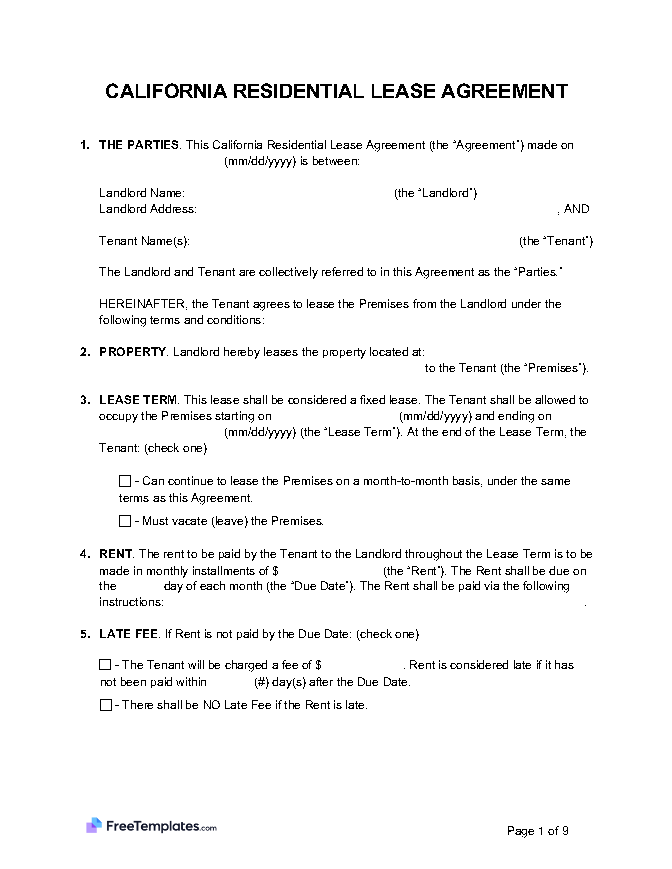By Type (6)
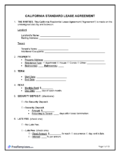 Standard Lease Agreement – A fixed-term residential rental document that is legally binding, typically lasting 1 year. Standard Lease Agreement – A fixed-term residential rental document that is legally binding, typically lasting 1 year.Download: PDF, MS Word, ODT |
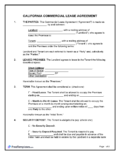 Commercial Lease Agreement – A legal document between a landlord and a company for renting a property for business purposes. Commercial Lease Agreement – A legal document between a landlord and a company for renting a property for business purposes.Download: PDF, MS Word, ODT |
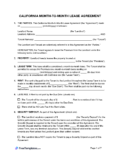 Month-to-Month Lease Agreement – A short-term, periodic rental contract that renews monthly unless proper notice is given. Month-to-Month Lease Agreement – A short-term, periodic rental contract that renews monthly unless proper notice is given.Download: PDF, MS Word, ODT |
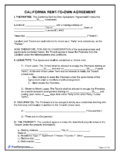 Rent-to-Own Agreement – A rental lease stipulating that the tenant can purchase the rental property from the landlord after paying rent for a disclosed amount of time. Rent-to-Own Agreement – A rental lease stipulating that the tenant can purchase the rental property from the landlord after paying rent for a disclosed amount of time.Download: PDF, MS Word, ODT |
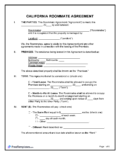 Roommate Agreement – A formal arrangement between individuals who live together that outlines house rules and responsibilities. Roommate Agreement – A formal arrangement between individuals who live together that outlines house rules and responsibilities.Download: PDF, MS Word, ODT |
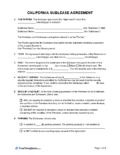 Sublease Agreement – With initial approval from the landlord, a tenant can rent out all or part of the rental premises to a new tenant for a period not exceeding the original lease’s term. Sublease Agreement – With initial approval from the landlord, a tenant can rent out all or part of the rental premises to a new tenant for a period not exceeding the original lease’s term.Download: PDF, MS Word, ODT |
Disclosures
Asbestos Notification (conditional) – In properties built before 1979, landlords must inform tenants of known asbestos-containing construction materials, specific hazardous material locations, procedures for preventing or minimizing exposure, health risks associated with exposure, and where to find detailed safety instructions. § 25915
Bed Bug Addendum – Before renting out a unit, a landlord must give prospective tenants written notice about bed bugs, including their appearance, behavior, biology, and details about bed bug bites. The notice must also explain the importance of cooperation in preventing and treating infestations and the need for proper reporting. It must be in at least 10-point font. § 1954.603
Carbon Monoxide Detector Compliance (conditional) – Landlords must have working carbon monoxide monitors for residential rental properties with fossil-fuel-based heaters and/or appliances. § 17926.1
Death (conditional) – A landlord must disclose if a death has occurred in the rental premises within the last 3 years unless the person died from AIDS-related complications. § 1710.2
Demolition (conditional) – If the owner or their agent applies for a permit to demolish the residential building, they must give a prospective tenant written notice before entering into a lease agreement, requiring or accepting any payments, including application screening fees. § 940.6(a1)
Flood Hazard (conditional) – If the property is in a flood zone, the landlord must disclose this information to the tenant before signing the lease, including how to get additional information and owner’s insurance coverage. § 8589.45
Just Cause Addendum – Landlords must provide a statement of cause if they wish to terminate a lease, provided all occupants have resided in the property for 12 months or more or at least one tenant has lived there for 24 months or more. § 1946.2(a)
- Just cause can include at-fault reasons like non-payment of rent, lease violations, and nuisances, as well as no-fault causes like the owner’s intent to occupy the property, removing the property from the rental market, and compliance with government regulations. § 1946.2(b)
Lead-Based Paint Disclosure (conditional) – If the property was built before January 1, 1978, landlords must write whether it has lead-based paint, how to limit exposure to the hazardous material, and how to identify symptoms if exposed.
Megan’s Law – Lease agreements must include information about Megan’s Law, which provides information on registered sex offenders in California. § 2079.10a(3)
Methamphetamine or Fentanyl Contamination (conditional) – The landlord must disclose a copy of the order if the rental unit has been contaminated or is in remediation. § 25400.28
Mold Disclosure (conditional) – If landlords know or reasonably believe mold is present, exceeds the permissible exposure limits, or poses a health threat, they must provide written notice to the potential renters. § 26147
Mold Prevention – Residential landlords must also give a booklet about the potential health risks of mold before entering the lease agreement. § 26148
Pest Control (conditional) – If mitigation has been conducted, the tenant or future renter must receive the pest control company’s inspection report. § 1099
Rent Limit Addendum – A signed written notice in 12-point font or larger alerting the tenant to how much a landlord can increase the rent from year to year by California law. § 1946.2(3)
Smoking Policy (conditional) – If smoking tobacco is prohibited on the rental premises or in certain areas, it must be disclosed in the lease agreement. § 1947.5(b)
Shared Utilities – If the rental property has a shared gas or electrical meter, the lease agreement must disclose how the utilities will be calculated and billed to the tenant. § 1940.9
Security Deposit
Maximum Amount – The most a landlord can charge for unfurnished rental units is 2 months’ rent. The landlord can charge up to 3 months’ rent for furnished units. § 1950.5(c1)
Inspection Before Move Out – The tenant can request an initial inspection of the property up to 2 weeks before the final walkthrough after vacating the premises. Based on the inspection, the landlord shall give the tenant an itemized statement outlining the repairs and cleaning that would be deducted from the security deposit. § 1950.5(f)
Returning to Tenant – After the tenant moves out of the property, the landlord has 21 days to mail or personally deliver a copy of an itemized statement for any deductions and return any remaining balance to the tenant. If the tenant does not provide a forwarding address, mailings will be sent to the unit they moved out of. § 1950.5(g)
Paying Rent
Grace Period – In California, there is no grace period. Rent is due on the day disclosed in the lease agreement.
Maximum Late Fee – Late fees for delayed rent must be reasonable and written in the lease agreement. § 1671
- Los Angeles County defines reasonable as 5% of the monthly rent. Late Fees | LACounty.gov
Returned Checks (NSF) – Landlord can charge $25 for the first bounced check and $35 for each additional dishonored payment. § 1719
Reasons for Eviction (3)
Non-Payment of Rent – If rent is not paid on the due date, the landlord can send the tenant a 3-Day Notice to Quit, which gives the tenant 3 days to pay the rent in full or move out. If the tenant stays after the 3 days and does not pay rent, the landlord can begin the eviction proceedings. California Courts | Types of Notices
Non-Compliance – If the violation can be fixed, the landlord must give notice and an opportunity to cure the breach. If not fixable, a 3-day Notice to Quit may be served. § 1946.2(2c)
Illegal Activity – If the tenant commits a severe lease violation, such as selling drugs, the landlord can serve a 3-day Notice to Quit, instructing the tenant to move out within 3 days (not counting weekends or court holidays). California Courts | Types of Notices
